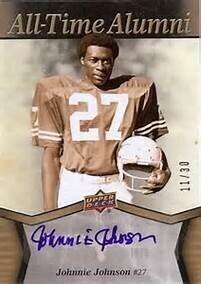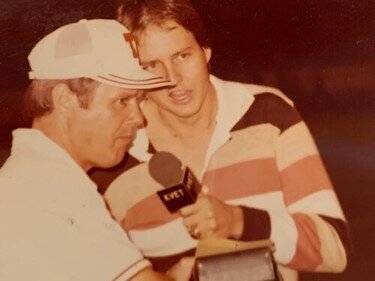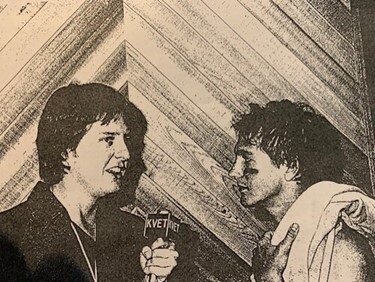TEXAS-OU WEEK FLASHBACK: BIG DEFENSE IN BIG D, 1976-77
BY LARRY CARLSON
LOVING COLLEGE FOOTBALL AS I DO, I wistfully look back almost every week to the lost art of defense. Like most of my heroes -- George Washington, Davy Crockett and Elvis, to name a few -- defense is gone but hardly forgotten. And when it's Texas-OU week, my mind re-focuses on what I consider to be the Longhorns' two greatest defensive games in this nasty street fight of a series.
The masterpieces came in back-to-back years, 1976 and 1977. In spite of largely the same cast of characters in uniform, the outcomes of the games and seasons bear no resemblance. But the Texas defense dominated both contests.
In October of forty-five years ago, a much-maligned Texas team limped into Dallas, having been shocked in their opener. Since Doug Flutie was only an eighth-grader, many Texas fans likely presumed that a small, private school with affiliations to the Catholic church but not named Notre Dame, would lead to a blowout win. But Marty Akins, after three seasons of guiding the wishbone offense, had graduated. In his place as the starter was a walk-on quarterback. Texas had star wishbone FB Earl Campbell, but the Tyler Rose was not in full bloom, nagged by hamstring injuries. The Horns barely beat puny North Texas, 17-14, before burning Rice en route to the State Fair matchup with the Sooners.
Darrell Royal, whose Texas squads had beaten his alma mater in 12 of 13 battles between 1958-1970, had hit a dry hole against the Sooners, losing five in a row. Royal was consumed with the notion -- and new evidence that would later prove him right -- that the Okies had been spying on UT practices in recent years. His accusations had gone public, as had his description -- unintended for public consumption -- of Barry Switzer and his staff as "sorry bastards." Loud, cursing OU fans rained taunts and boos upon Royal in pre-game activities.
Royal might not have had a veteran QB or a healthy Earl but he did have the Campbell who was still with him in his twentieth season at the Forty Acres. "Iron Mike" Campbell steadily fielded motivated units with talent and discipline.
Oklahoma ranked third, would be missing senior QB Dean Blevins but speedy sophomore Thomas Lott was a much bigger running threat. He would pilot OU the rest of the season, taking them to the Fiesta Bowl. His backfield included three runners who could break for TDs at any time -- Horace Ivory, Elvis Peacock, and Kenny King -- and formed the most feared ground attack in America.
What happened that day is unimaginable in today's wide-open college football. Texas and OU dueled in the proverbial phone booth (also gone from contemporary America) for 60 minutes. The Longhorns got a Russell Erxleben field goal to end the first half and added another to start the final period. Coach Campbell's Texas defense was absolutely impenetrable. For almost 55 minutes, OU was stunned and stopped on every play. Longhorn senior Lionell Johnson had a ridiculous 23 tackles. And he got plenty of help from everyone in white, including Bill Hamilton, Brad Shearer, and freshman Lance Taylor who had five solo stops in his first Red River Bloodfest.
One more UT first down would likely ice the game. But a Texas running back fumbled at the Horns' 37 yard-line on third and short. At this point, the Okies had charted just two first downs. Let that stat settle in. Two first downs.
But OU rallied now somewhat against the exhausted Horns defense. In ten more gut-wrenching plays, the Sooners inched their way to three first downs, then a touchdown.
"We felt like we controlled the game," Taylor told me this week from Tulsa, of all places, where he is in the software business and heads the local Texas Exes chapter. "Then one mistake and it's tied. I think everyone was in shock."
Oklahoma kicker Uwe von Schamann trotted on the field confidently. He had hit 140 straight PATs. But his long snapper had seemed shaky that day. Lionell Johnson, the Louisiana senior having his finest day as a Longhorn, reportedly leaned in close to the snapper for a few cautionary words of prophecy. Taylor told me that teammate Dwight Jefferson later said that Johnson did, indeed, tell the center he would snap the ball over his holder's head. Was Taylor sure that it wasn't an apocryphal story? I had to know. Dutifully, Lance tried to contact Dwight, now known as the Honorable Dwight E Jefferson. But the Judge, now retired, was out. So Lance called Morgan Copeland, Longhorn linebacker-turned-lawyer. And Copeland confirmed. Yes, Lionell Johnson uttered the magic, hexing words.
So now you know, as Paul Harvey would say, the rest of the story. The snap sailed over holder Bud Hebert's head. He scrambled after the ball and heaved a desperation pass that was picked off by UT's Steve Collier. You couldn't return errant PAT attempts in ancient times, so the whistle blew. What had reliably looked like a Texas win, then suddenly a certain OU victory, was stuck at 6-6.
Texas only moved the needle just a bit and got a roughing penalty when Erxleben punted. But nothing much worked and UT lost nine yards on a sack right when it appeared Texas might get manage a long-range attempt for Erxleben. The official game clock was malfunctioning and Royal did not want to lose now on a fluke fourth down gone wrong. From the Texas 47, Royal chose to punt. The Sooners weren't taking any chances, either. Erxleben blasted one sky high into the end zone and the gun sounded on the dissatisfying tie. Nobody was celebrating. Ted Constanzo, UT's backup quarterback that day, told me several years ago that it was the strangest scene he witnessed in football. "When that punt landed and the game was over, it just went quiet," Constanzo said of the previously quaking Cotton Bowl, shaking his head. "It was eerie."
Like the two teams of weary warriors, seventy-five thousand very avid, vocal fans were spent. Some slumped in disbelief for a few moments. Others shuffled away into the jarring disconnect of the midway's whir of whimsy and fried delights.
Darrell Royal's reaction expressed what most witnesses on both sides likely felt. He bent over and dry heaved on his way to the locker room and the post-game post-mortem with reporters. He would later recall this: "I never felt as sick about a game as I did that one. I wanted that game more than any I competed in or coached in."
Two months later, he would retire at 52. Mike Campbell, recommended by DKR to succeed him, was passed over by the UT Board of Regents for young Fred Akers, Campbell, the best assistant coach ever at Texas, would turn in his keys the day he got the news, finished with coaching.
TEN LONG MONTHS LATER, Akers, and a revitalized band of Longhorns were college football's most pleasant surprise. The Horns had avenged Boston College, 44-0, annihilated Virginia, 68-0, and threshed Rice, 72-15. Yes, Oklahoma was ranked second in the country but UT had soared from unranked in the preseason to number five in early October.
The 1977 Texas-OU showcase turned out to be another defensive brawl. Covering the series for the first time, I was astonished by the almost unimaginable ferocity of the hitting. I recall the noise of the collisions when two dozen or so Sooners would wrestle Earl Campbell down near the Texas sidelines. The cacophony of pounding shoulder pads and helmets really did seem to drown out the crowd noise. Even the Sooners' infamous trash-talking soon began to ebb after tackles. Nobody wanted to be caught counting their change while multiple bodies were flying at full speed. It was hard for me to believe that people were getting up from those smoking demolition derby crashes on every play.
It didn't take long before not all the combatants were able to rise. Texas QB Mark McBath went down in the first quarter with a season-ending broken ankle. Then his replacement, Jon Aune, a strong-armed soph with great potential, was shelved by torn knee ligaments, an injury so severe that it effectively ended Aune's career.
The offensive story would be authored by Cinderella's male counterpart, Randy McEachern. He would answer the call that afternoon and then steer the Horns to a magical season, enabled greatly by an uber-successful Heisman campaign from the peerless, and now sleeked-down Campbell, even more dangerous at 225 pounds than at 248..
But as it had been in '76, this October day was owned by the defense. And by the excellence of All-America punter/placekicker Russell Erxleben. The junior from Seguin had scored all of UT's points the previous year and kept OU at bay with nine punts for a 49-yard average.
Now, a year later, thanks to Erxleben's 64-yard missile of a field goal and a TD run by Earl, Texas led 10-3 at intermission. Oklahoma added a field goal in the third quarter. But with eight minutes left to play, Erxleben answered with a 58-yard FG and Texas was up by seven again, 13-6. Too much time, though.
Now OU made its strongest, longest push, eating clock and driving from their 20 to the UT 14-yard line.
Three plays scraped out nine more yards to the five. Fourth and one.
Middle linebacker Lance Taylor looked back this week to that moment, and reminded me that the '77 "D" utilized multiple fronts under coordinator Leon Fuller. The call this time was for the Flex.
"The weakest point for that defense is option to the weakside," Taylor explained. "So I'm thinking that if (QB Thomas) Lott goes weakside I have to fly outside and make sure he doesn't beat me outside."
Sure enough, Lott started to his left. Taylor followed the plan to fly outside, "but as I got there, he planted." and cut back inside. "I looked back and there's Johnnie Johnson and Brad Shearer, meeting him in the hole."
Johnson, headed for All-America honors at safety, hit Lott high while Shearer, soon to claim the Outland Trophy as the nation's premier lineman, hit him low. No gain. Texas ball. "Johnnie always gives me credit for turning him back in," Taylor said, "but I was sure glad they were there."
Now, could the Horns, on the brink of their first series win in seven years, run the clock out? Nope. One yard in three tries. The Horns had made the last of their nine first downs.
Erxleben had to back himself deep in the end zone to punt with a few minutes still on the clock. He coolly bombed OU with a 69-yard punt. It was returned nine yards, and the burnt orange defense -- Shearer, Taylor, Johnson, Copeland, Churchman, McMichael and company -- continued its blue-ribbon day, shutting down four more plays. Texas ran out the clock on a 13-6 knockout. For the Longhorns and their legions of fans at the Cotton Bowl and at their TV's, it was bliss.
Taylor remembers a jubilant charter flight back to Austin that night, and he and his teammates were amazed to find hordes of Texas fans at the airport, clamoring for their Longhorns. "One of the reasons I went to Texas was for the OU game," said Taylor, an El Paso Coronado blue-chipper. "Morgan Copeland and Bill Hamilton said the first time you walk out of that tunnel, you'll feel like you're floating on air."
Soon, it would be time to remember the lyrics from West Texas troubadour Joe Ely, who famously sang, "Have you ever seen Dallas from a DC-9 at night....well, Dallas is a jewel, Dallas gives a beautiful light..."
Lance, who would become only the second UT linebacker to make first team All-Conference as a soph (Tommy Nobis came first and only Derrick Johnson, in '02, has duplicated Taylor's feat) was later hit by injuries, first to a shoulder, then to a knee. But he vividly recalls fans cheering wildly and beating on the team buses as they left the airport. "The bus took us to The Drag on the way to the stadium...the sidewalks were packed with fans and cars were everywhere, honking and cheering," Taylor summed up the fond memory this way: "You would've thought we were conquering heroes coming back from overseas."
For Texas fans, a seven-year war to beat its most hated rival had ended in victory. And UT's big "D" was back from Big D. The next week, they would journey to Fayetteville and again not surrender a touchdown to another top ten team. But that magical '77 season, in full, is another story for another day.













